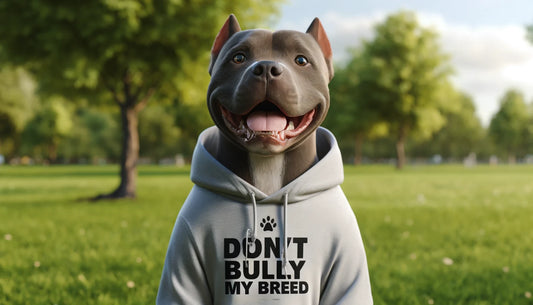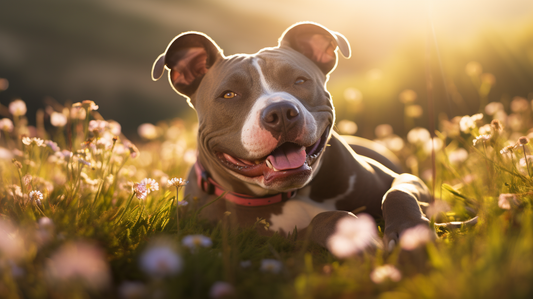Pitbull is Not a Breed: The Truth About These Misunderstood Dogs
Tom DrachmanThe Pitbull Label: What Does it Actually Mean?
The term "pitbull" is often used as a catch-all phrase to describe a range of dog breeds that share certain physical and behavioral characteristics. However, this label can be misleading and confusing, as it encompasses several different breeds that are distinct in their origins, temperaments, and physical features.
The American Pit Bull Terrier, the Staffordshire Bull Terrier, the American Staffordshire Terrier, and the Bull Terrier are among the breeds that are often referred to as pitbulls. However, each of these breeds has its own unique history and characteristics. For example, the American Pit Bull Terrier was originally bred for dog fighting but has since become a popular companion dog due to its loyalty and affectionate nature.
The confusion around the term "pitbull" can lead to misconceptions and stereotypes about these dogs, as well as unfair and unjustified breed-specific legislation. In fact, many of the dogs that are labeled as pitbulls in shelters and rescues are actually mixed breeds, with little or no genetic connection to the original pit fighting breeds.
It's important for dog owners and enthusiasts to understand the nuances of breed classification and to avoid stereotyping based on breed labels. Rather than focusing on breed, it's more productive to assess a dog's individual temperament, behavior, and personality when considering adoption or ownership. By understanding the history and characteristics of different breeds, we can work towards promoting responsible dog ownership and dispelling myths about these beloved companions.
Pitbull Stereotypes and Misconceptions
Despite their loyal and loving nature, pit bulls are often subjected to negative stereotypes and misconceptions. These beliefs are often unfounded and based on misinformation. Here are some of the most common stereotypes and misconceptions about pit bulls:
- Pit bulls are inherently aggressive: This is one of the most common stereotypes associated with pit bulls. However, research shows that pit bulls are not inherently aggressive. Like any other dog breed, their behavior is influenced by their environment, socialization, and training.
- Pit bulls have a locking jaw: This is a common myth that has been perpetuated in the media. In reality, pit bulls have the same jaw structure as any other dog breed, and there is no scientific evidence to support the idea that they have a "locking jaw."
- Pit bulls are dangerous to other animals: Pit bulls are often portrayed as dangerous to other animals, but this is not necessarily true. Like any other dog breed, pit bulls can be trained to coexist peacefully with other animals.
- Pit bulls are not good family pets: This is another common misconception about pit bulls. In reality, pit bulls are loyal and loving family pets that thrive on human interaction and attention.
It's important to remember that pit bulls are individuals, and their behavior should not be judged based on stereotypes or misconceptions. Like any other dog breed, pit bulls should be evaluated on a case-by-case basis, and their behavior should be based on their individual temperament and behavior.
Supporting Pitbull Rescue Organizations
Pitbull rescue organizations play a vital role in caring for and finding homes for these misunderstood dogs. By supporting these organizations, you can make a real difference in the lives of pit bulls and help change negative perceptions of the breed.
There are many ways you can support pitbull rescue organizations. One way is to donate money. Even a small donation can help provide food, shelter, and medical care for a pit bull in need. You can also donate items like blankets, toys, and food.
Another way to support pitbull rescue organizations is to volunteer your time. You can help with things like walking dogs, cleaning kennels, and assisting with adoption events. By volunteering, you'll not only be helping pit bulls, but you'll also have the opportunity to learn more about the breed and make a positive impact in your community.
If you're unable to donate money or time, you can still support pitbull rescue organizations by spreading awareness. Share their social media posts, talk to your friends and family about the work they do, and help dispel negative stereotypes about pit bulls.
Educating Others About Pitbulls
One of the most effective ways to combat negative stereotypes about pit bulls is through education. By educating others about the truth about pit bulls, we can help change perceptions and create a more positive image of the breed.
Here are some suggestions for how you can help educate others about pit bulls:
- Share positive stories and facts about pit bulls on social media. By sharing uplifting stories and educational content, you can help change the conversation around pit bulls and challenge negative stereotypes.
- Talk to your friends and family about your own experiences with pit bulls. If you have a pit bull, share how they've enriched your life and why you love the breed. If you don't have a pit bull, share stories of pit bulls you've met or heard about and why they're so special.
- Attend pitbull-related events in your community. Many pitbull rescue organizations host events like adoption fairs and fundraisers. Attending these events is a great way to meet other pitbull lovers, learn more about the breed, and show your support for pitbull rescue organizations.
- Correct misinformation when you hear it. If someone makes a negative comment about pit bulls or spreads misinformation, politely correct them and provide accurate information.
By taking these small steps, we can help change the conversation around pit bulls and create a more positive image of this misunderstood breed.
Debunking Pitbull Myths
Pitbulls have been the subject of many myths and misconceptions over the years. These myths have contributed to the negative stereotypes surrounding the breed and have made it difficult for pitbulls to find loving homes. In this section, we will explore and debunk some of the most common pitbull myths.
Myth #1: Pitbulls have locking jaws.
One of the most persistent myths about pitbulls is that they have locking jaws. This is simply not true. While pitbulls have strong jaws, they do not have any special mechanism that allows them to lock their jaws. In fact, no breed of dog has a locking jaw.
Myth #2: Pitbulls are inherently aggressive.
Another common myth is that pitbulls are inherently aggressive and dangerous. This is simply not true. Like any other dog breed, pitbulls can be trained to be loving, friendly, and well-behaved. In fact, pitbulls are often used as therapy dogs due to their loving and affectionate nature.
Myth #3: Pitbulls are more likely to attack than other breeds.
This is another common myth that is simply not true. According to the American Veterinary Medical Association, there is no evidence that pitbulls are more likely to bite or attack than any other breed of dog. In fact, many other breeds, such as Chihuahuas and Dachshunds, are known to be more aggressive than pitbulls.
Myth #4: All pitbulls are the same.
This is another myth that is simply not true. There are several breeds that are often classified as pitbulls, including the American Pit Bull Terrier, Staffordshire Bull Terrier, and American Staffordshire Terrier. While these breeds share certain characteristics, they are all distinct breeds with their own unique personalities and temperaments.
In conclusion, it is important to separate fact from fiction when it comes to pitbulls. By debunking these common myths, we can help to combat the negative stereotypes surrounding the breed and promote a better understanding of these loving and loyal dogs.
How to Advocate for Pitbulls
Pit bulls often face a lot of discrimination and negative stereotypes, which can make it hard for them to find loving homes. As a pit bull lover, you can help change the narrative and advocate for these misunderstood dogs. Here are some tips and resources to help you get started:
- Educate yourself: The first step to advocating for pit bulls is to learn more about them. Read up on the breed, including their history, temperament, and common misconceptions. By educating yourself, you can be better equipped to dispel myths and promote accurate information.
- Share positive stories: Pit bulls are just like any other breed - they can be loving, loyal, and well-behaved pets. Share positive stories and experiences with your friends and family to help change the narrative about pit bulls. Social media is a great way to spread the word and showcase the joys of pit bull ownership.
- Support pit bull rescue organizations: There are many organizations that specialize in rescuing and rehabilitating pit bulls. By supporting these organizations, you can help ensure that these dogs get the care they need and find loving homes. Consider volunteering, donating, or fostering a pit bull in need.
- Get involved in local advocacy efforts: Look for advocacy groups in your area that are working to combat pit bull stigma and promote responsible ownership. Attend events, sign petitions, and get involved in the conversation to help make a difference.
- Be a responsible owner: As a pit bull owner, it's important to be a responsible and knowledgeable caregiver. Make sure your dog is properly trained, socialized, and kept in a safe and secure environment. By being a model pit bull owner, you can help promote responsible ownership and combat negative stereotypes.
Remember, advocacy takes time and effort, but the impact it can have on the lives of pit bulls is immeasurable. By taking action and speaking out, you can help change the narrative about these amazing dogs and make a real difference in the world.
Supporting Pitbull Rescue Organizations:
Pitbulls are often misunderstood and discriminated against due to negative stereotypes and misconceptions. However, there are many organizations dedicated to rescuing and advocating for these dogs. These organizations work to provide homes, medical care, and support for pitbulls in need.
By supporting pitbull rescue organizations, you can help make a difference in the lives of these dogs. There are many ways to get involved, such as volunteering your time or making a donation. Many organizations also have foster programs, where you can temporarily care for a pitbull in need until they find a forever home.
Here are some resources to help you find and support pitbull rescue organizations:
- The American Pit Bull Foundation
- Best Friends Animal Society
- Pit Bull Rescue Central
- The Humane Society of the United States
- Local animal shelters and rescue organizations in your area
Remember, every little bit helps. By supporting pitbull rescue organizations, you are helping to combat negative stereotypes and provide a better future for these dogs in need.
Educating Others About Pitbulls:
One of the most effective ways to combat negative stereotypes and misconceptions about pitbulls is through education. By educating others about the truth about pitbulls, we can help break down barriers and promote a more positive image of these dogs.
Here are some suggestions for how you can help educate others about pitbulls:
- Share positive stories and images of pitbulls on social media
- Engage in conversations with others about pitbulls and dispel common myths and misconceptions
- Share resources and educational materials, such as articles and videos, with friends and family
- Attend or host events that promote pitbull education and awareness
- Support organizations and initiatives that focus on pitbull advocacy and education
Remember, educating others about pitbulls is a powerful way to combat negative stereotypes and promote a more positive image of these misunderstood dogs. With your help, we can work towards a future where all dogs are judged based on their individual behavior and not on their breed.
Conclusion: Celebrating Pitbulls for Who They Are
After debunking common myths and stereotypes surrounding pitbulls, it's important to recognize these dogs for who they truly are. Rather than perpetuating negative beliefs, we should celebrate pitbulls for their loyalty, affectionate nature, and unique personalities.
It's crucial to support pitbull rescue organizations and help educate others about the truth about these dogs. By doing so, we can combat stigma and advocate for pitbulls to be treated fairly and with the love and respect they deserve.
At Pittie Choy, we are passionate about celebrating all dogs, including pitbulls. We believe that every dog deserves a chance to be loved and appreciated for their individuality, and we are committed to spreading awareness and positive representation of pitbulls.
So let's come together and celebrate pitbulls for who they truly are – loving, loyal companions who deserve our respect and admiration. And remember, whether you are a pitbull owner or simply an advocate for all dogs, there are many ways to support these wonderful animals and make a difference in their lives.
Join us in spreading positivity and love for pitbulls, and let's continue to challenge misconceptions and stereotypes one step at a time.






